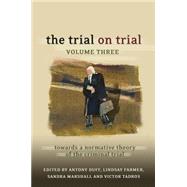
| Preface | p. v |
| Introduction: Theorising the Criminal Trial | p. 1 |
| The Trial Under Attack | p. 1 |
| Why Develop a Normative Theory of the Criminal Trial? | p. 4 |
| Methodology | p. 10 |
| The Criminal Trial and its History | p. 15 |
| Normative Conceptions of the Trial in Historical Perspective | p. 17 |
| Introduction | p. 17 |
| The Trial in History, i: From Proof to Trial | p. 22 |
| The Trial in History, ii: The Altercation Trial C.1400-C.1700 | p. 29 |
| The Trial in History, iii: The Adversarial Trial 1700-1900 | p. 40 |
| The Trial in History, iv: The Adversarial Trial in the Late Twentieth Century | p. 50 |
| The Criminal Trial and its Values | p. 55 |
| Truth and the Trial | p. 61 |
| Simple Instrumentalism and the Trial | p. 62 |
| What Truth? | p. 70 |
| Why Does Truth Matter? | p. 78 |
| Truth, Proof and Knowledge | p. 87 |
| Truth and Communication in the Trial | p. 93 |
| Instrumentalism and the Rule of Law in the Trial | p. 93 |
| The Defendant's Participation | p. 97 |
| Excluding Improperly Obtained Evidence | p. 102 |
| Evidence of Bad Character and Criminal Record | p. 110 |
| Hearsay and Orality | p. 116 |
| Truth and Calling to Account: Some Problems | p. 119 |
| Calling to Answer | p. 127 |
| Introduction | p. 127 |
| Responsible Citizens | p. 130 |
| Calling to Answer and Calling to Account | p. 142 |
| The Modes of The Trial | p. 149 |
| The Implications of The Institutional Setting of the Trial | p. 153 |
| Applications, Implications and Further Questions | p. 163 |
| Why Call to Answer? The Trial and Criminal Justice | p. 165 |
| Introduction: How Important is the Criminal Trial? | p. 165 |
| Guilty Pleas and Plea Bargaining | p. 169 |
| Punishments Without Trials | p. 180 |
| Diversions from the Criminal Process | p. 184 |
| Non-Criminal Regulation | p. 189 |
| Communicative Participation | p. 199 |
| Introduction | p. 199 |
| What Is Participation? | p. 201 |
| The Defendant's Participation and the Role of Counsel | p. 203 |
| Participation of the Complainant | p. 213 |
| Judgment and Participation | p. 217 |
| Participation and Communication | p. 220 |
| Conclusion | p. 223 |
| The Principle of Integrity | p. 225 |
| Introduction | p. 225 |
| The Foundation of the Integrity Principle | p. 227 |
| The Application of the Principle | p. 241 |
| Conclusions | p. 256 |
| The Public Character of the Trial | p. 259 |
| Introduction | p. 259 |
| Why Public Justice? | p. 262 |
| The Public Hearing | p. 271 |
| Issues in Public Justice | p. 281 |
| Conclusions | p. 285 |
| The Limits of the Criminal Trial: Security, Truth and Reconciliation | p. 287 |
| Introduction | p. 287 |
| Trials and Security | p. 290 |
| Trials, Truth and Reconciliation | p. 294 |
| Reconciliation and Restoration | p. 300 |
| Conclusion | p. 305 |
| References | p. 307 |
| Index | p. 327 |
| Table of Contents provided by Ingram. All Rights Reserved. |
The New copy of this book will include any supplemental materials advertised. Please check the title of the book to determine if it should include any access cards, study guides, lab manuals, CDs, etc.
The Used, Rental and eBook copies of this book are not guaranteed to include any supplemental materials. Typically, only the book itself is included. This is true even if the title states it includes any access cards, study guides, lab manuals, CDs, etc.